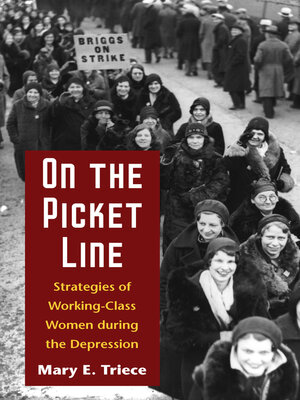
Sign up to save your library
With an OverDrive account, you can save your favorite libraries for at-a-glance information about availability. Find out more about OverDrive accounts.
Find this title in Libby, the library reading app by OverDrive.



Search for a digital library with this title
Title found at these libraries:
| Library Name | Distance |
|---|---|
| Loading... |
Bonnie Ritter Book Award, National Communication Association's Feminist and Women Studies Division, 2008.
On the Picket Line uncovers the voices of working-class women, particularly those active in the Communist Party, U.S.A., in order to examine how these individuals confronted the tensions between their roles as workers, wives, mothers, and consumers. Combining critical analysis, Marxist and feminist theory, and labor history, Mary E. Triece analyzes the protest tactics employed by working class women to challenge dominant ideologies surrounding domesticity.
She details the rhetorical strategies used by women to argue for their rights as workers in the paid labor force and as caregivers in the home. Their overtly coercive tactics included numerous sit-ins, strikes, and boycotts that won tangible gains for working poor and unemployed women. The book also gives voice to influential figures in the 1930s labor movement (many of whom were members of the Communist Party, U.S.A.), such as Ella Reeve Bloor, Margaret Cowl, Anna Damon, Ann Burlak, and Grace Hutchins. Triece ultimately argues that these confrontational protest tactics of the 1930s remain relevant in today's fights for more humane workplaces and better living conditions.
| Contents Acknowledgments Introduction: Paradox and Social Change in the 1930s 1. Establishing the Context 2. Negotiating the Public/Private Split 3. The Paradox of the Woman Worker 4. The Paradox of the Woman Orator Conclusion: Lessons Learned from the 1930s Notes References Index |"Triece notes ideologies of motherhood are complex and simultaneously contain elements of both liberation and oppression. On the Picket Line is important in its linking of the study of communication to social science history in pursuit of this complexity; the interdisciplinary nature of this book should be appealing to students of women's and labor history across a variety of disciplines, from communication to political science to history to women's studies."—Journal of Women's Politics and Policy|
Mary E. Triece is an associate professor in the School of Communication at the University of Akron. She is the author of Protest and Popular Culture: Women in the U.S. Labor Movement, 1894-1917.







